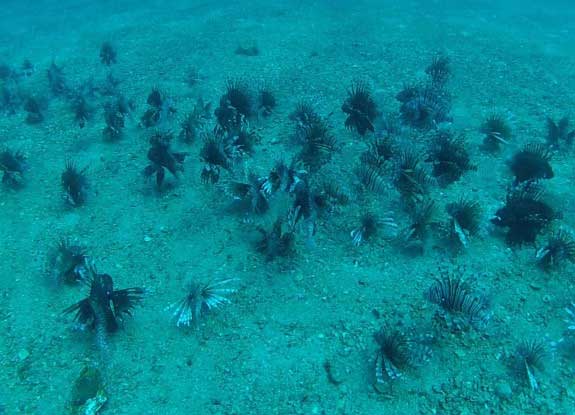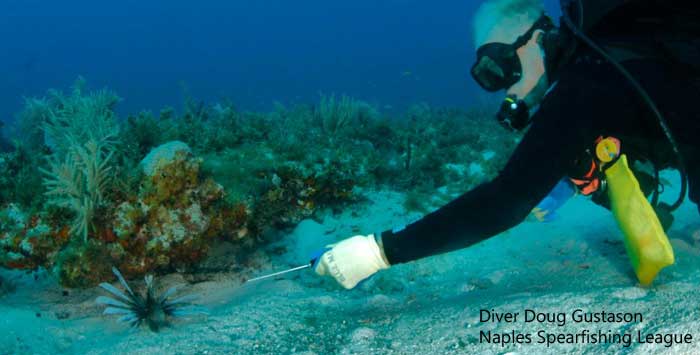Lionfish (Pterois volitans)
Species > Lionfish
Florida's Most Wanted Fish is a non-native, evasive fish that has no predators and is rapidly reproducing in all parts of Florida both inshore and offshore. Lionfish have voracious appetites with no food preferences, they eat everything in their path including our cherished sportfish. The female lionfish will produce over two million eggs a year, year round in warm tropical waters, presenting a huge threat to our reef ecosystems if left unchecked.

“The expansion of lionfish populations represents a serious threat to marine ecosystems in Florida,” said FWC Executive Director Nick Wiley. “Dealing with this highly invasive, nonnative species and the negative impacts on our environment and economy will require a strong cooperative effort among government agencies and affected stakeholders. All ideas are welcome in discovering new ways to help control lionfish populations, educate the public, mitigate the effects lionfish have on native species, and understand their impacts.”
"Native to the Indo-Pacific region, lionfish were first spotted in Florida waters in the mid-1980s. In recent years, their numbers have increased dramatically and their population has spread throughout the Caribbean, Gulf of Mexico and up the Atlantic coast of the United States. Recent research indicates they have a negative impact on our native species and habitats. Lionfish have no natural predators in our waters, and they eat and compete for food with native species, including economically important species such as snapper and grouper. Currently, the best method of control is human removal via dip-net or spear." source FWC

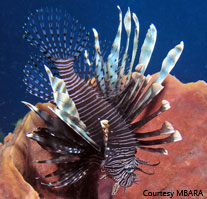
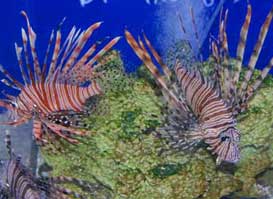
Lionfish can be found out in the open on reefs and wrecks waiting to ambush their prey. They have also been found in estuaries and far inland in brackish waterways, in 1,000 feet of water, on shallow reefs, in boat harbors, sea grass beds and mangrove communities. They are everywhere with no preference as to where they will make themselves at home.
Lionfish have no predators. Many studies have been done and no other species besides man will pursue a lionfish. So we wondered
"is the lionfish carcass eaten after it is dies in the ocean?" The answer is yes! Biologists have not figured out why the lionfish is so unappealing alive to all species, even sharks, but they do know all kinds of critters will feed on lionfish carcasses. So if you want to help out and are afraid to collect the fish, just spear it dead and leave it for other species to eat. - recycle a lionfish (shall we start a new trend?)
It has been estimated that the removal of 1,000 lionfish in a tournament can save 2 to 9 million juvenile fish species that would of been eaten by those 1,000 lionfish. A single lionfish could reduce the juvenile fish population on a single reef by 80% in just 5 weeks. In the Bahamas, a 2 year study revealed the native fish species were reduced 85% on a single lionfish infested reef, proving lionfish can be detrimental to native species and reef ecosystems.
How to Catch Lionfish
You can catch lionfish in shallow water with a snorkel, pole spear or hand net. Always wear gloves when handling this fish. In deeper water you need diving gear and either use a speargun or gaff to catch them and deposit them into a thick walled dive bag until you return to the surface. An easy and effective way to remove lionfish is to use 2 short handled landing nets, one to scoop a fish, the other to close it in (sandwich the 2 nets together) then swim to the surface to deposit the fish in a bucket.
Lionfish are active during low light times - sun rise and sun set. During daylight hours, lionfish are not aggressive and do not spook easily when approached by divers, so wait until your spear is 3 or 4 inches from the fish then spear it. Your main concern is avoiding those venomous spines, one sting and your day is over. We have read relief can be found by the painful sting by immersing the effected area in as hot of water you can handle, usually above 105 degrees will neutralize the poison.
Stop the Lionfish Invasion!
In order to get the general public to help eradicate this species, many organizations have come up with ideas to create interest in harvesting lionfish. The only known predator of the lionfish is man; so join in and help out before they destroy our treasured natural resources. 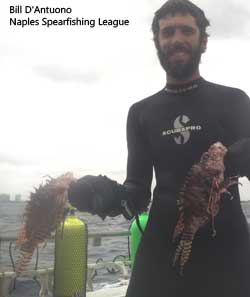
- Lionfish tournaments with cash prizes help eradicate lionfish by area.
- FWC recently changed the rules on harvesting lionfish - you do not need a license to catch lionfish!
- NOAA has a new campaign "Eat Lionfish." Restaurants are now offering the delicious lionfish as a gourmet item on menus.
- It is hoped that commercial fisherman might join the efforts and create a new market for the fish.
- Collier County, which has had a ban on spearfishing since the 1950"s, now allows spearfishing as of July 1, 2013 in order to encourage the general public to help eradicate the lionfish that are now in Southwest Florida. Naples Spearfishing League was instrumental in getting Collier's law removed and is available to help anyone interested in hunting the lionfish.
- John Pennekamp in Key Largo had a lionfish tournament in the summer of 2013 and allowed participants to spearfish the lionfish (spearfishing is normally banned).
- Jewelry makers are using lionfish for novelty items
- Research is being done for potential medicinal uses
- Ban the import of lionfish and supply the aquarium trade with locally caught lionfish.
Eat Lionfish!
We have the best Lionfish Cookbook for sale on our store. Save a Reef, Eat Lionfish!
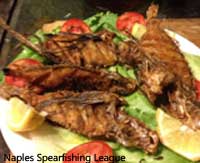 Lionfish are excellent dinner fare with beautiful white meat that tastes like hogfish or small grouper. Lionfish is gaining in popularity and is now being served in many Florida restaurants as a gourmet meal. Most anglers fillet their catch but some like to bread them whole as in the picture to the right. Cook lionfish as you would any other fish and it's great in a Ceviche too.
Lionfish are excellent dinner fare with beautiful white meat that tastes like hogfish or small grouper. Lionfish is gaining in popularity and is now being served in many Florida restaurants as a gourmet meal. Most anglers fillet their catch but some like to bread them whole as in the picture to the right. Cook lionfish as you would any other fish and it's great in a Ceviche too.
To prepare lionfish for cooking, you can fillet it like any other fish avoiding the spines as you fillet them off the meat. Or you can cut off the spines off the body then with a pressure hose wash off the scales, they come right off if you point the hose from the tail to the head.
![]() REEF.org - Lionfish Resources, Reports, Derbys and more
REEF.org - Lionfish Resources, Reports, Derbys and more
![]() 2013 FWC Lionfish Summit If you want to learn more about lionfish and what is being done to stop the Lionfish Invasion, watch the videos of this very educational summit.
2013 FWC Lionfish Summit If you want to learn more about lionfish and what is being done to stop the Lionfish Invasion, watch the videos of this very educational summit.


